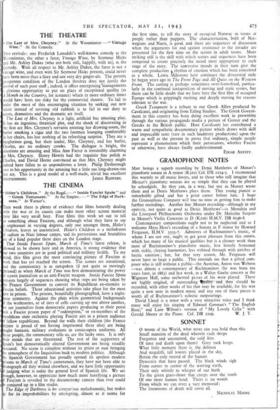THE CINEMA
Hitler's Children." At the Regal.--" Inside Fascist Spain " and " Greek Testament." At the Empire.—" The Edge of Dark- ness." At Warner's.
THIS week there is plenty of evidence that films honestly dealing with the war or its causes can make most other screen material taste like very small beer. Four films this week set out to tell us something about Fascism, and although what they have to say s unpleasant in varying degrees, only one amongst them, Hitler's Chiidren, leaves us unenriched. Hitler's Children is a melodrama
sadism in Nazi labour camps, and its perversions and brutalities re of a kind popular these days on the London stage..
That Inside Fascist Spain, March of Time's latest release, is llowed to be shown here and in America, is strong evidence that cur two countries are in good political and military health. To my
.nd, this film gives the most convincing picture of Fascism at nrk that has yet reached the screen. Tne scenes are sensational, nd the commentary is as outspoken (if not quite so movingly hrased) as when March of Time was first demonstrating the power if screen journalism as an anti-Fascist weapon. Inside Fascist Spain insists largely of sequences showing what steps are being taken by e Franco Government to convert its Republican ex-enemies to ascist beliefs. These educational activities take place for the most 'art in prison. The prisons, beautifully photographed, have a night- are symmetry. Against the plain white geometrical backgrounds if the workrooms, or of tiers of cells curving up one above another,
e see journalists from democratic papers producing as their penal ask a Fascist prison paper of " redemption," or ex-members of the epublican state orchestra playing Fascist airs, to a prison audience f fellow republicans. Beyond the walls their children (the Franco gime is proud of not having imprisoned these also) are being ught fantastic military evolutions in comic-opera uniforms. All ese people, the commentary tells us, are the lucky ones. It is only heir minds that are threatened. The rest of the supporters of pain's last democratically elected Government are being steadily
ecuted. No scene is complete without its priest or nun bringing he atmosphere of the Inquisition back to, modern politics. Although c Spanish Government has proudly opened its spotless modem risons to March of Time's cameramen, they have not been able to hotograph all they wished elsewhere, and we have little opportunity
judging what is today the general level of Spanish life. We see ough, however, to appreciate how much more horrifying a picture Fascism is revealed to the documentary camera than ever could conjured up in a film studio.
The Edge of Darkness is by comparison melodramatic, but makes p for its improbabilities by attempting, almost as it seems for the first time, to tell the story of occupied Norway in terms of people rather than puppets. The characterisation, both of Nor- wegians and Nazis, is good, and there are sequences of discussion when the arguments for and against resistance to the invader are presented for the first time on the screen in adult terms. More striking still is the skill with which scenes and sequences have been composed to create precisely the mood most appropriate to each stage of the story. The successive moods in their turn give the complete production rhythm of emotion which has been conceived as a whole. Lewis Milestone here continues the directorial style he began years ago in The Front Page and All Quiet on the Western Front. The cutting is perhaps sometimes over-formalised, particu- larly in the continual juxtaposition of moving and static scenes, but there can be little doubt that we have here the first film of occupied Europe which is grippingly exciting and deeply moving for reasons relevant to the war.
Greek Testament is a tribute to our Greek Allies produced by Cavalcanti, and originating from Ealing Studios. The Greek Govern- ment in this country has been doing excellent work in presenting through the various propaganda media a picture of Greece and the Greeks to the British public. Here Cavalcanti has contributed a warm and sympathetic documentary picture which draws with skill and impeccable taste (rare in such laudatory productions) upon the past as well as the present to prove that ordinary, simple people represent a phenomenon which their persecutors, whether Fascist or otherwise, have always fatally underestimated.
EDGAR ANSTEY.


























 Previous page
Previous page